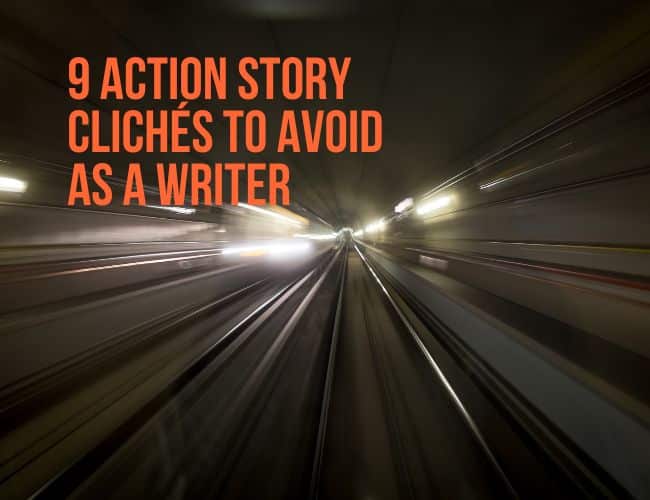Writing an action story or screenplay can be a lot of fun. There's something exhilarating about writing fast-paced action sequences filled with excitement and suspense.
However, it's important to avoid common clichés—overused ideas or stereotypes lacking original thought—if you want your story to stand out. In this article, we will take a look at 9 clichés to avoid when you are writing an action story or movie!

Today we have a guest post from screenwriter Neil Chase. Check out his advice to avoid falling into a cliché trap in your action stories and scenes.
What Is an Action Story?
According to Shawn Coyne, author of The Story Grid, “A story in the action genre focuses on the protagonist's sacrifice for life and death and generates excitement in the reader.”
That means the protagonist has to overcome someone or something stronger than them, usually on behalf of their community or other innocent victims.
Action genre conventions include heroes pitted against strong villains, a ticking clock to beat, intense action, and a fast pace.
9 Tired Action Clichés to Avoid
There are any number of ways to build an action story, but avoid using the following tired clichés and you'll keep your readers on the edge of their seats!
Cliché #1: A Friend's Betrayal
The plot device of a friend or family member betraying the hero of an action story has been used countless times, and often feels contrived and forced. Worse, it's typically the best friend or closest relative who is the betrayer, to the point where it's predictable.
For example, in Iron Man, Obadiah Stane is revealed as the traitor to Tony Stark, but there's not much surprise as there's virtually no one else it could be.
If you want to avoid this cliché, try putting a twist on it. Make sure there are other characters with something to gain or with close relationships with the hero, so when a betrayal occurs, we can't immediately guess which of them will be the culprit.
Or maybe the betrayal isn't what it seems, and there's a bigger picture to be revealed. And remember, no matter what, the betrayal has to have strong motivation and make sense. It can't only exist for shock value.
Cliché #2: Blowing Things Up and Walking Away in Slow Motion
Walking away in slow motion from an explosion is another popular action movie cliché. It looks cool on the big screen, but it's often used as a crutch by directors who can't think of a better way to end their scene.
From Wolverine to James Bond to Desperado, there are countless times this trope has been used. In reality, the shockwave and flames would kill the hero as quickly as the bad guys he just dispatched in the giant fireball. It's unrealistic and overused.
If you find yourself tempted to use this cliché, ask yourself if there's a more creative way to conclude your scene. Chances are, there is.
For example, in Mission Impossible, when a helicopter behind Ethan Hunt explodes in the Chunnel, he doesn't just shrug it off. It almost kills him. This is great because it adds another layer of danger immediately after he's just overcome a huge obstacle. So resist the urge to rely on this tired old trope and instead take the time to write an original, exciting ending to a scene that will leave your readers wanting more.
Cliché #3: Predictable Plot Twists
Recent films such as The King's Man, Red Notice, and the most recent Saw movie, all rely on plot twists that fail for being too predictable. The key to avoiding this cliché is to make sure that your plot twist is believable and that it contributes to the overall story, rather than simply as a “gotcha moment.”
It should be character or story-driven, with the motivation making sense, yet not so simple as to lose the shock value. Leave clues prior to your twist so that it makes sense, but not so many as to telegraph it so utterly that it surprises no one.
Additionally, avoid using convenient coincidences or sudden changes in character motivation that go against what has already been established.
Cliché #4: The Hero Is an Expert Marksman But the Bad Guys Can't Hit Him No Matter What!
Another cliché is the idea that the hero is not only an expert marksman, but he is also able to dodge every bullet! This often happens in scenes where the hero is outnumbered and outgunned but still manages to emerge victorious—often with barely a scratch.
While this can make for some exhilarating reading or viewing, such as in Commando or the Rambo films, it can also feel contrived and unrealistic.
A more believable and interesting story is one where the hero misses his intended targets from time to time and actually sustains injuries in the face of overwhelming odds. They manage to survive through resourcefulness and skill.
A great example of a hero who goes through the wringer but emerges victorious is Lorraine Broughton in Atomic Blonde, who barely ekes out a victory each time she's forced to shoot or fight her way out.
Cliché #5: The Hero Never Reloads His Gun
This cliché might seem like a small detail, but it's one that can quickly take a reader out of the story. After all, even the most skilled marksman would need to stop and reload at some point. When the hero never reloads, it creates a sense of false suspense and disbelief.
Instead, focus on creating believable action scenes that will keep your readers engaged.
A great example of doing this well is in the John Wick series, where the main character often has to pause mid-battle to either reload his guns or ditch them in favor of alternate weapons. This adds both a touch of realism and a unique spin to the obstacles he must overcome.
Cliché #6: Every Non-Lethal Gunshot Wound Is Treated Like a Flesh Wound
One of the most tired and overdone clichés in action movies is the non-lethal gunshot wound where someone gets shot, but it's no big deal because they were only hit in the shoulder/leg/arm and the bullet magically missed all their vital organs.
Even though this plot device is used time and time again, it's still cringe-worthy and unbelievable.
A better way to write an action scene would be to have the character get shot and wounded in a more realistic way. This will make the scene more believable and intense and will leave readers on the edge of their seats wondering what will happen next.
A perfect example is Furiosa in Mad Max: Fury Road, who sustains life-threatening injuries and then fights on to get her revenge despite them. It's brutal and riveting, and we genuinely don't know if she'll make it out by the end.
Cliché #7: The Hero is a Martial Arts Expert Despite Having No Training
Have you ever read a book or seen a movie where the hero appears to be a martial arts expert, despite having little to no training? It's one of the most common action story clichés, and it's one that you should avoid as a writer. After all, how could someone be a master of martial arts without ever having taken a single lesson?
A better option would be to give your hero some training, even if it's just a brief montage scene showing them learning and practicing their moves. Or do the opposite and have them power through with brute force and willpower.
A good example is Dae-Su in Oldboy, who has no formal training of any kind but spends fifteen years toughening himself up into a vessel of vengeful rage, so when he finally unleashes on the bad guys, it's as gritty and dirty as it is believable and enjoyable.
Cliché #8: The Hero Beats Up Anyone Regardless of Size and Skill
In any action story, the hero needs to be physically capable. Unfortunately, many writers fall into the trap of making their hero too powerful, able to take down anyone regardless of their size or skill.
It's one thing if the hero is a black belt or built like Arnold Schwarzenegger, but it's something quite different if they weigh 120 lbs wet and are facing off against a mountain of muscle. Not only is this unrealistic, but it's also boring.
A truly badass hero is one who is vulnerable and has to work hard to defeat their enemies. They might get beat up along the way, but they never give up.
A classic example is John McLane in Die Hard, who is so thoroughly spent by the time the last frame rolls that we're completely invested. This type of hero is much more engaging and relatable than a one-dimensional superhero. To avoid this cliché, make sure your hero is human.
Cliché #9: The Hero Drives Better Than a Race Car Driver
One of the most common clichés in action stories is the hero who is an amazing driver even though they have no specialized training. This is often used as a way to create suspense or to add an element of danger to the story.
However, it has been done to death at this point, and readers are likely to roll their eyes at yet another hero who somehow manages to escape from a high-speed chase unscathed.
If you find yourself tempted to use this cliché, try to come up with a more original way to create suspense or add excitement to your story. A great example is in The Blues Brothers, where Elwood is anything but a good driver, and the Bluesmobile literally falls apart by the end of the epic and thoroughly entertaining car chase.
Keep Your Reader Guessing
It's important for writers to be aware of the clichés that can weaken your work. One technique to help you conquer clichés is to start by writing out the cliché first.
Yes, go ahead and write out that predictable plot twist, that betrayal, that racecar-driving hero. Then, brainstorm other ways to do each one. Create a range of ideas and choose the one that is most unexpected while still satisfying readers.
By avoiding these nine action story clichés, you'll create stronger, more original stories that will keep your readers engaged until the very end.
Which action story cliché are you tired of seeing? Tell us in the comments.
 Neil Chase is a story and writing coach, award-winning screenwriter and actor, radio show host, and author of the horror-western novel, Iron Dogs. Neil believes that all writers have the potential to create great work. His passion is helping writers find their voice and develop their skills so that they can create stories that are both entertaining and meaningful. Check out his website for tips and inspiration!
Neil Chase is a story and writing coach, award-winning screenwriter and actor, radio show host, and author of the horror-western novel, Iron Dogs. Neil believes that all writers have the potential to create great work. His passion is helping writers find their voice and develop their skills so that they can create stories that are both entertaining and meaningful. Check out his website for tips and inspiration!PRACTICE
Choose one of the clichés above and write the most cliché scene you can imagine.
Then, add in one or two surprising twists to freshen it up!
Take fifteen minutes to write. When you’re finished, share your work in the Pro Practice Workshop here. Not a member yet? Join us here!
This article is by a guest blogger. Would you like to write for The Write Practice? Check out our guest post guidelines.



0 Comments